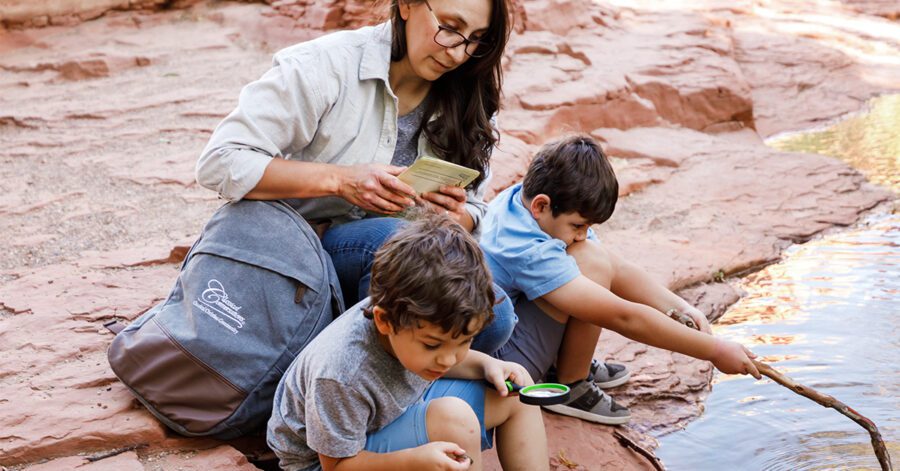Theologian Abraham Kuyper said, “There is not a square inch in the whole domain of our human existence over which Christ, who is Sovereign over all, does not cry, ‘Mine!’” Not only does everything belong to God, but He has also given us responsibilities of stewardship over all His creation. This means stewardship over everything. With so many important topics in American society, music takes a back seat to the more prevalent efforts and issues of our day. As Kuyper reminds us, we must remember that God does not give us neutral kingdom work. Therefore, God’s gift of music must be seen as a tool for redemption and not a neutral aspect of life where we escape from the pressures and stresses of this world. Hopefully, this article will lead you to examine your own experiences with music in order to gain more awareness for how we should engage with music appropriately. One important approach for parents is an attempt to cultivate the family’s engagements with music in a communal context.
When I was in college, most of my experiences with music were spent on my own, listening to my favorite artists and my favorite playlists. For many of us, this habit of experiencing music privately started in our youth, perhaps long before college. Even in our discussions about music, this individualistic tone is at the front. Discussions about music are filled with personal taste and preferences. It is often one of the first things we bring up when getting to know someone new. This individualistic focus on musical taste can often be attached to our own identity. I remember turning people off completely because they said my band was a terrible band. I took it as a personal attack. In some regard, I sadly wanted nothing to do with that person. This was obviously pride swelling up in my heart because I had identified with my own desires, my tastes and preferences. It was all about me! When a people shares negative opinions about the music I like, I wrongly conclude that the person has somehow said they do not like me by saying they do not like my favorite band. Don’t they know that band “x” changed my life and gave me a sense of my identity in this culture where no one understands me or can see how special I am? One author refers to this kind of thinking as artistic romanticism and it exists in listeners and performers alike. It existed in me and to be honest, I still struggle with romanticized ideas about my own musical tastes.
The individualistic self-expressive artist will often tell you that he or she must tell everyone what he or she feels. “I must sing what’s on my heart” is often the expression when in most cases this kind of “art” should not be heard or articulated at all. This may seem ungracious at first and I am not suggesting someone respond to such expressions in rejection. I am merely pointing out where that sort of thinking originates and that it should be questioned more than it is. Because I feel it, I should express it. And you should like it! And if you don’t, well…I am misunderstood and no one knows what its like to be me… It is so easy for us to play the victim and create ideas of being even more profound by placing ourselves above others who do not understand. It is almost as if we desire to be rejected so we can latch on to ideas and feelings of being more unique or special. This is pseudo artistry and it is a plague in American youth culture. It is a form of artistic adolescence which is heavily filtered into our culture more now than ever before. Somehow artistic alienation is seen as true artistry. But are artists being alienated for the right reason? Are they being alienated for Jesus?
I want to suggest that this individualistic expression is a result of man’s sin to take God’s gifts and use it against God’s ultimate design. I am not suggesting that music should never be used as self-expression. I am only presenting a warning for how most of us treat music at large and this temptation is even more prevalent in our youth culture. I believe our private, personal experiences with music dominate so much of our interaction with music that we slowly and implicitly alienate ourselves from others. This is not to say we should never use headphones. That would be silly. I am saying that we need to be more intentional with our music habits. We need to listen to music more with others. We need to ask one another questions about the music with which we engage and seek to use music more to the purpose of serving others and not ourselves. These kinds of intentions must be coached and encouraged for the sake of our children.
Part of music’s purpose is to bind people together for the purpose of worshipping our Creator. Do we think about this purpose in between Sundays spent worshipping with God’s people? One important practical application is to make sure your family is singing together. This can be done in many different contexts, but especially in family devotions. If you parents struggle with singing well, there are plenty of resources online that can help lead the singing. Even if you sound bad, do not let that stop you from singing with those around you. Our media makes it seem embarrassing if you are trying to sing when you are not any good at singing. Television shows like American Idol are detrimental to people’s thinking that if you can’t sing well, you shouldn’t sing at all. This is not true. Psalm 95:1-2 says, “Come, let us sing for joy to the Lord; let us shout aloud to the Rock of our salvation. Let us come before him with thanksgiving and extol him with music and song.” Notice this is done in the plural “us,” and our God admires this “noise.” God desires for us to sing, but He especially desires for us to sing together. So sing with your children, play an instrument for your spouse, jam with your friends, and encourage others to participate in music together.




